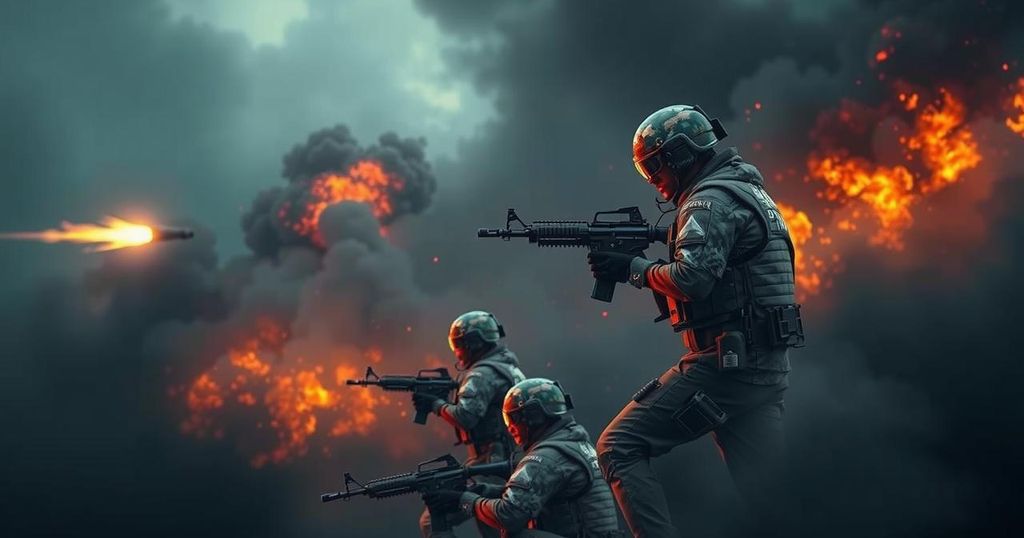World news
ALEPPO, ASIA, BASHA, BASHAR AL ASSAD, CIVILIAN CASUALTIES, CONFLICT, DRONE STRIKES, EUROPE, EUROPE/ASIA, FATEMIYOUN, HELMETS, HEZBOLLAH, IRAN, IRAQ, ISRAEL, KATIAB HEZBOLLAH, KATIE WILLIAMS, MILITARY OPERATIONS, MOSCOW, RUSSIA, SEAN BELL, SYRIA, TARTUS, UK, UKRAINE, VLADIMIR PUTIN, WAR
Michael Grant
0 Comments
Iran-Backed Militias Reinforce Assad Amid Renewed Syrian Conflict
Iran-backed militias have entered Syria to assist President Bashar al-Assad amid renewed airstrikes targeting rebel positions, resulting in at least 25 casualties. The recent rebel offensive in Aleppo represents a significant challenge to Assad’s regime and underscores the ongoing volatility and complexity of the Syrian civil war, which has raged for over a decade.
Recent developments in Syria have seen the entrance of Iran-backed militias entering the region, signaling a significant escalation in the ongoing conflict. These militias, including groups such as Katiab Hezbollah and Fatemiyoun, have reportedly crossed into Syria from Iraq to support President Bashar al-Assad against a surprising offensive by rebel forces. Compounding this situation, Syrian and Russian airstrikes have targeted rebel positions, leading to at least 25 casualties, predominantly among civilians, in northern regions like Idlib and Aleppo.
This renewed aggression has reignited interest in the protracted Syrian civil war, which has largely remained out of the public eye in recent years. Military analysts attribute the resurgence of conflict to various factors, including a recent bold offensive by the rebel group, Hayat Tahrir al Sham, who managed to capture significant areas, including much of Aleppo, indicating a possible shift in the dynamics of power within the country.
The involvement of Russia, which has provided crucial air support to the Assad regime since 2015, remains a critical element of the conflict. Russia’s strategic partnership with Assad, rooted in prior military assistance and promises of naval base access, has aimed to solidify its influence while countering Western interests in the region. However, the shifting focus toward the Ukraine conflict appears to have created vulnerabilities, enabling rebel forces to regain territory and momentum.
As the airstrikes target insurgent positions, there are reports that areas heavily populated by civilians have been caught in the crossfire, amplifying the humanitarian crisis in these regions. Eyewitness accounts from the ground confirm widespread devastation, urging global observers to reconsider the implications of renewed hostilities as they threaten to exacerbate the existing humanitarian disaster, further displacing millions and claiming more lives amid ongoing struggles for basic resources and safety.
The Syrian civil war, which has persisted for over a decade, has resulted in extensive loss of life and displacement of populations. Originally sparked by anti-regime protests in 2011, the conflict has evolved into a multifaceted war involving various local factions and international players. The government, under President Bashar al-Assad, has relied heavily on both Russian and Iranian support to maintain its hold on power amid continuous uprisings from various rebel groups, including jihadist factions. Russia’s military intervention in 2015 marked a pivotal turning point that helped stabilize Assad’s regime, but the recent rebel resurgence has alarmed both the Syrian government and its allies. With tensions flaring anew, the implications for regional stability and humanitarian conditions remain severe.
The current situation in Syria underscores an alarming escalation in violence as Iran-backed militias join forces with the Assad regime amid intensified airstrikes against rebel positions. The resurgence of the rebel offensive in Aleppo marks a potentially transformative phase in the protracted conflict, challenging the stability that has been tenuously held since the war’s earlier years. The humanitarian toll of renewed warfare raises urgent questions about the future of civilians caught in the crossfire and highlights the need for international attention and intervention.
Original Source: news.sky.com




Post Comment